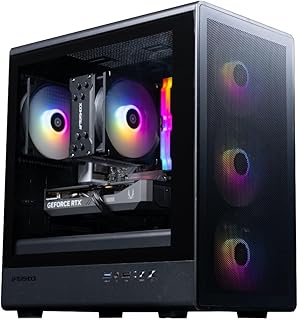Gaming PCs have long been hailed as the ultimate choice for serious players, outshining consoles in power, flexibility, and versatility. While the upfront cost may be higher, the longevity and ease of upgrades make them a worthwhile investment for enthusiasts. Transitioning from consoles to PCs can be daunting, given the myriad brands, components, and customization options available in the market.
Choosing a gaming laptop or PC involves considering factors like graphical processing capabilities, storage, CPU, and memory. The graphics card determines the gaming experience, with higher-end GPUs enabling smoother gameplay at superior settings. Processors from Intel or AMD dictate the PC’s processing power, crucial for multitasking, streaming, and content creation alongside gaming.
Storage capacity, comprising Solid State Drives (SSDs) and Hard Disk Drives, impacts a PC’s ability to store games and data efficiently. Build quality and upgradability are also vital considerations to future-proof your system for upcoming game releases and technological advancements.
For most players, opting for a prebuilt gaming PC is a convenient choice, eliminating the need to select individual components and ensuring compatibility. Brands like Alienware, known for their powerful and futuristic designs, offer ready-to-play systems catering to various gaming needs.
Lenovo’s Legion Tower 5i Gen 10 stands out for its performance, reliability, and value, making it an ideal choice for entry-level and mainstream gamers. The inclusion of AI technology enhances graphics and overall gaming experience, coupled with a sleek design.
Companies like Tech Junction and Skytech provide pre-built PCs with high-performance components and minimalist designs, appealing to enthusiasts seeking immersive gaming experiences. These systems offer a balance between power and affordability, making them attractive options for gamers.
When considering budget builds, prioritizing the GPU for optimal gaming performance is key, while allocating resources for essential components like CPUs, RAM, and storage ensures a seamless gaming experience without overspending on unnecessary features.
High-end gaming rigs equipped with 4K ray-tracing capabilities, such as HP’s OMEN 35L Gaming Desktop PC, deliver top-tier performance for serious gamers. These systems, powered by advanced GPUs and CPUs, offer unparalleled graphics and processing power for demanding games.
Custom-build services from brands like Aftershock PC cater to gamers seeking personalized configurations tailored to their specific requirements. These services provide a balance between performance and affordability, allowing players to create a system optimized for their gaming preferences.
Ultimately, the choice between a gaming PC and a console depends on individual preferences and needs. While gaming PCs offer superior graphics, upgradability, and diverse gaming experiences, consoles provide simplicity and exclusive titles. Understanding the advantages and limitations of each platform is crucial in selecting the ideal gaming setup for an enjoyable and immersive gaming experience.
📰 Related Articles
- Enhance Gaming Performance: Best SSD Options for PC Gamers
- Choosing the Best Adventure Bike Helmet: Key Factors Explained
- Best Gaming PC Cases: Performance, Style, and Cooling Options
- Optimal Gaming PC Placement: Key Lessons for Performance Maintenance
- Mastering Gaming PC Assembly: Key Components and Build Process






